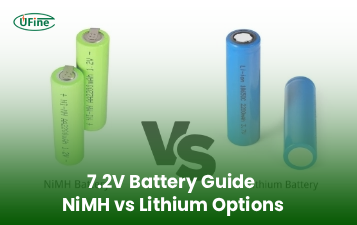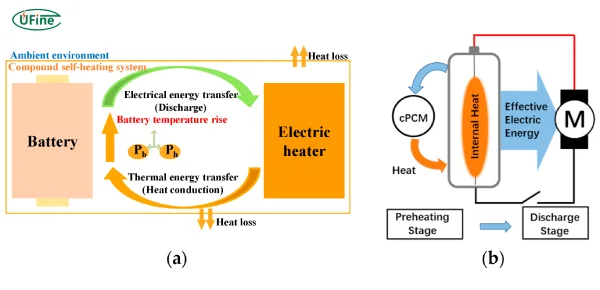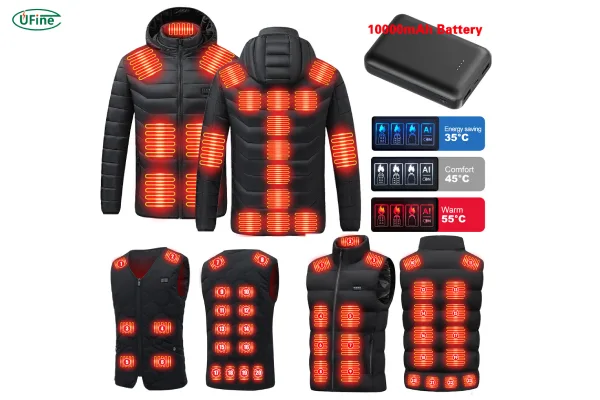
- Part 1. What is a heater battery?
- Part 2. How do heater batteries work?
- Part 3. What devices use heater batteries?
- Part 4. What types of batteries are used in heater devices?
- Part 5. Why lithium batteries are ideal for heater devices
- Part 6. What to look for in a heater battery
- Part 7. How long do heater batteries last?
- Part 8. How to charge and store heater batteries
- Part 9. Common heater battery problems and solutions
- Part 10. Custom heater battery solutions
- Part 11. How to choose the right heater battery
- Part 12. FAQ
It’s cold outside, the wind bites, and all you want is to stay warm. But lugging around a bulky heater or worrying about open flames isn’t ideal. That’s where heater batteries come in—a small, smart way to generate heat. These compact energy packs power heated clothing, gloves, insoles, and more. They’re not just practical—they’re a warm hug when you need it most.
If you’ve ever wondered, “What is a heater battery?”, you’re in the right place. In this article, we’ll explore how they work, where they’re used, how to choose them, and why Ufine Battery’s high-quality lithium heater batteries give you unmatched performance and safety.
Part 1. What is a heater battery?
A heater battery is a rechargeable or non-rechargeable battery designed to power heating elements instead of just lighting or electronics. Think of it as the heart of heated gear—like jackets, gloves, and blankets. These batteries provide a steady flow of electricity to heat wires embedded in the fabric or device. That wire gets warm, and soon, so do you.
Unlike standard batteries in gadgets, heater batteries need more current and must perform well even in cold temperatures. That’s why choosing the right battery is crucial to your comfort.
Part 2. How do heater batteries work?
Let’s break it down:
- Electrical Power — the battery supplies electrical energy.
- Current to Heaters — electricity flows through thin resistive wires sewn into clothing or fabric.
- Heat Generation — these wires warm up, providing gentle, even heat.
- Control Systems — many heated devices have temperature settings and auto-shutoff features.
A heater battery isn’t just a power source; it’s an integrated system—battery, wire, control circuitry—all working together for safe, user-friendly warmth.
Part 3. What devices use heater batteries?
Heater batteries power a surprising variety of everyday items and gear:
- Heated jackets, hoodies, and vests
- Gloves, socks, and insoles
- Seat warmers for cars or office chairs
- Heated sleeping bags and blankets
- Medical warming pads for therapy
- Camping and survival gear for extreme cold
- Industrial wearables for outdoor workers or first responders
Heater batteries offer portable warmth anywhere—mountains, bedside, work sites—without fuss or fussing.
Part 4. What types of batteries are used in heater devices?
There are three main battery chemistries used for heaters:
➤ Lithium-ion / Lithium Polymer
- High energy density (long runtime)
- Rechargeable, average lifespan of 300–500 cycles
- Compact, lightweight
➤ Lithium Iron Phosphate (LiFePO₄)
- Lower energy density but much safer and longer-lasting (500–1000+ cycles)
- Better low-temperature performance
- Excellent thermal stability
➤ Alkaline or Disposable Batteries
- Inexpensive and easy to find
- Single-use, low runtime, not ideal for regular heating needs
For regular heating applications, lithium-based batteries are the preferred choice due to their power, safety, rechargeability, and longevity.
Ufine Battery designs advanced lithium heater batteries with built-in BMS (Battery Management Systems) to prevent overcharge, overheating, and short circuits, giving you peace of mind when it matters.
Part 5. Why lithium batteries are ideal for heater devices
Lithium batteries aren’t just common—they excel in heating applications. Here’s why:
- High Energy Density: Long runtime in a small package.
- Rechargeable: No need to keep buying new batteries.
- Cold Weather Performance: With the right design, they work in sub-freezing temps.
- Variety of Form Factors: From ultra-thin to compact rectangle packs.
- Long Cycle Life: Many hundreds of charge–discharge cycles.
That’s why heated apparel and outdoor gear often use lithium batteries—they match heat output with size, performance, and reliability.
Part 6. What to look for in a heater battery
When choosing a heater battery, consider these key specs:
- Voltage: Commonly 3.7V, 7.4V, or 12V—choose according to your device.
- Capacity (mAh or Ah): More capacity = longer heating time.
- Output Current: Must match heater element’s draw.
- Temperature Range: Must keep working in cold weather.
- Safety Features: Look for integrated BMS, protection against short circuits and overheating.
- Size & Weight: Should fit your gear without weighing you down.
- Certifications: UL, CE, RoHS ensure regulatory compliance.
A quality heater battery ticks all these boxes—and Ufine Battery custom-builds packs that perfectly complement your device’s design and heating specs.
Part 7. How long do heater batteries last?
Battery lifespan has two parts: runtime per charge and total cycle life.
Runtime per Charge
Depends on capacity and heat setting—usually 2 to 8 hours, sometimes more with larger packs or lower heat.
Cycle Life
Lithium batteries typically endure 300–1000+ cycles. At 2–4 hours per use, that’s several seasons of reliable warmth.
Factors like storage, charging habits, and temperature affect lifespan. But with the right care, a lithium heater battery can last years on the job.
Part 8. How to charge and store heater batteries
Optimal care keeps your battery healthy:
- Use the correct charger—voltage and current must match.
- Charge fully before first use, but avoid overcharging.
- Store at 40–60% charge if unused for weeks.
- Keep cool—excess heat ages batteries faster.
- Top off periodically during winter to prevent deep discharge.
- Don’t fully discharge—stop before it shuts off.
These simple steps can double the life of your heater battery!
Part 9. Common heater battery problems and solutions
No technology is flawless, but many issues are preventable:
Battery not holding charge?
Causes: aged cells, over-discharge, poor charger.
Fix: Replace if >1 year old or consult a battery expert like Ufine for upgrade.
Battery overheating?
Check if output matches device. Use batteries with thermal protection and built-in BMS for safety.
Battery fails in cold?
Some chemistries become sluggish below freezing.
Ufine’s cold-resistant lithium packs maintain performance down to -20°C with integrated thermal control.
Part 10. Custom heater battery solutions
Off-the-shelf batteries might not fit your device’s needs. That’s where custom solutions matter:
- Need a thin pack for heated insoles?
- Want extended runtime for an industrial vest?
- Designing wearable tech that requires ultra-lightweight battery?
Ufine Battery specializes in custom lithium heater batteries—tailored in:
- Voltage
- Capacity
- Shape and size
- Connector type
- Temperature tolerance
Whether you’re building wearable medical gear or rugged outdoor clothing, Ufine crafts batteries to exact specs.
Reach out to us today and let us design the perfect heater battery for your device.
Part 11. How to choose the right heater battery
Follow this step-by-step guide:
- Identify device voltage.
- Estimate runtime needed.
- Calculate capacity required (Simple formula: power (W) × hours ÷ voltage).
- Choose a battery with matching capacity and current.
- Ensure it fits physically.
- Select batteries with BMS and safety certifications.
- Buy from reputable suppliers, like Ufine Battery, who support custom needs and quality.
With these steps, you’ll avoid wasted output, overheating, or future device damage.
Part 12. FAQ
Can I charge a heater battery with solar power?
Yes—just use a charger that matches voltage and current from solar panels or a regulated power source.
Are heater batteries waterproof?
Not inherently. The heating device often provides waterproofing, but avoid immersing batteries directly. Look for sealed or IP-rated packs.
Can I use a heater battery in other devices?
Only if it matches voltage, capacity, and connector. For safety and performance, use as designed.
Will a larger capacity battery last longer?
Yes, generally. But ensure it fits and doesn’t overload your gear’s heat output.
Why won’t my heater battery work in freezing temps?
Most lithium chemistries perform poorly below 0°C. Choose cold-resistant packs or warm the battery before use.
Related Tags:
More Articles

NiMH vs Lithium 7.2V Battery and Charger: Which Is Better?
Compare 7.2V NiMH vs Lithium batteries and chargers in 2025. Learn runtime, weight, charging, lifespan, and cost to choose the best for your device.
How to Choose the Right 7.2V Battery and Charger for Your Device?
Learn how to choose the right 7.2V battery and charger for optimal performance, safety, and longevity across RC, tools, medical, and industrial devices.
Big Square Battery Safety Standards You Must Know
Learn key safety standards for big square batteries to avoid fire risks, shipping delays, and compliance issues in EV, industrial, and energy storage projects.
Big Square Battery Applications in Solar & Industrial Equipment
Big square batteries deliver high capacity, stable output, and long life for solar, industrial, and backup power. Explore key uses and advantages.
Big Square Battery vs Cylindrical Battery: Complete 2025 Guide for EVs, ESS & Industrial Devices
Choosing the right battery is key for designers and engineers. Compare big square vs cylindrical batteries to find the best fit for your application.




